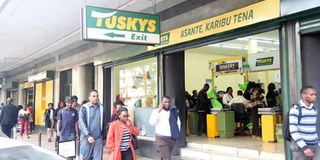CAK eyes more stability in law-backed retailer rules

What you need to know:
- CAK orders retailers, manufacturers, and suppliers to create a code of practice that will become law and enforceable by the regulator.
- The move marks tightening of regulation in the industry, prompted by major losses suppliers have incurred from collapsed and struggling retailers.
- CAK’s move comes after supermarket operator Tuskys recently defaulted on suppliers to the tune of billions of shillings, just two years after Nakumatt Holdings collapsed with Sh18.5 billion of supplier debt.
The Competition Authority of Kenya (CAK) has ordered retailers, manufacturers, and suppliers to create a code of practice that will become law and enforceable by the regulator.
This is expected to standardise and define several aspects of firms’ commercial relationship such as payment period and what constitutes default.
The move marks tightening of regulation in the industry, prompted by major losses suppliers have incurred from collapsed and struggling retailers.
The Ministry of Industry, Trade and Co-operatives brought the players together to create a code of practice in 2019, but this particular document was not anchored in law and could not, therefore, be enforced.
CAK now says its call for a new code of practice is based on parts of the Competition Act that empower it to make such a move in industries where abuse of buyer power is likely to occur.
Buyer power means the ability of a purchaser to extract more favourable terms from a supplier on whom it can also impose significant opportunity costs by, for example, delaying payments.
“Take notice that in view of the findings of the said investigations, the authority hereby invokes the provisions of Section 24A(3) and directs the Retail Trade Association of Kenya, Kenya Association of Manufacturers and Association of Kenya Suppliers, being the key stakeholders in the retail sector, to submit a binding Code of Practice for purposes of publishing by the Authority,” the regulator said in a July 27 letter to the parties.
“The authority is aware of the existence of a Retail Trade Harmonised Code of Practice agreed by stakeholders and signed on January 17, 2019.
“The authority is open to receiving the same should the stakeholders agree on the same and or receive an updated version (attaching the addendum) within the next sixty (60) days from the date of this letter.”
The document to be adopted will form the basis of the regulator’s enforcement actions going forward.
CAK’s move comes after supermarket operator Tuskys recently defaulted on suppliers to the tune of billions of shillings, just two years after Nakumatt Holdings collapsed with Sh18.5 billion of supplier debt.




